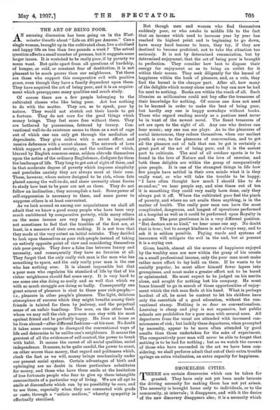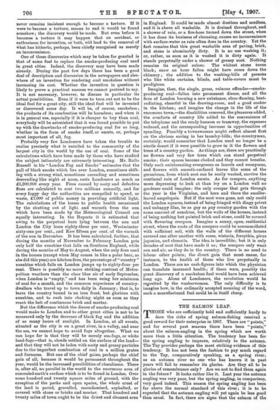SMOKELESS CITIES.
HERE are certain discoveries which can be taken Va. granted. They have only not yet been made because the driving necessity for making them has not yet arisen. The necessity is brought home only to individuals, or to the community, at intervals ; it disappears, and with it the desire of the new discovery disappears also; it is a necessity which never remains insistent enough to become a torture, If it were to'become a' torture; means to end it would be found somehow; the discovery would be made. But even before it becomes a torture it may' happen' that an accident, or enthusiasm for invention, or both, will lead to the removal of Whit has hitherto, perhaps, been chiefly recognised as merely an inconvenience.
One of these discoveries which may be taken for granted is that of 'some fuel to replace the smoke-producing coal used in great cities. Indeed, the discovery may have been made already. During the past few days there has been a good deal of description and discussion in the newspapers and else- where of an invention for rendering coal smokeless without increasing its cost. Whether the invention in question is likely to prove a practical success we cannot pretend to say. It 'is not necessary, however, to discuss in particular Its actual possibilities. Even if it were to turn out not to be the ideal fuel for a great city, still the ideal fuel will be invented or discovered some day. It will be, of course, smokeless ; the products of its combustion will be harmless; and when it is in general use, especially if it is cheaper to buy than coal, everybody will be astonished that it was found possible to put up with the drawbacks of smoke-producing coal for so long, whether in the form of smoke itself, or smuts, or, perhaps most important of all, fog.
Probably very few Londoners have taken the trouble to realise precisely what is entailed to 'the community of the largest city in the world by the use of coal. Some of the calculations which have been made by those who have studied the subject intimately are extremely interesting. Mr. Rollo Russell in his "London Fog and Smoke" estimates that the pall of black smoke which lies over London, sometimes shift- ing with a strong wind, sometimes' ascending and sometimes descending like night at noon, costs Londoners as mach as 25,200,000 every year. Fires caused by sooty and defective flues are calculated to cost two millions annually, and for every foggy day the authorities are compelled to spend, or waste, 27,000 of public money in providing artificial light, The calculations of the losses to public health occasioned by the shutting out of light and warmth from the sun which have been made by the Meteorological Council are equally interesting. In the Reports it is estimated that owing to tie perpetual haze lying between the sun and London the City loses eighty-three per cent., Westminster sixty-one per cent., and Kew fifteen per cent. of the warmth Of the sun in December. It has been calculated, further, that during the months of November to February London gets only half the sunshine that falls on Southern England, while during the months of May to August, when the only fires used in the houses (except when May comes in like a polar bear, as she did this year) are kitchen fired, the percentage of " country " sunshine which falls on London jumps up to eighty-four per dent There is' possibly no more striking contrast'of Metro- politan weathers than the clear blue air of early September, when London is "empty," and has been rising her minimum of coal for a month, and the common experience of country- dwellers who travel up to town daily in January ; that is, to leave the country bound in an iron frost, but glorious with sunshine, and to rush into choking night as soon as they reach the belt of continuous brick and mortar.
But the difference which the disuse of smoke-producing coal would make to London and to other great cities is not to be measured only by the decrease of black fog and the addition of so many hours of sunlight. In London, at all events, situated as the city is on a great liver, in a valley, and near the sea, we cannot hope to avoid fogs altogether. What we can hope for is that they will be merely sea-fogs, or white land-fogs—that is, clouds settled on the surface of the land— and that they will not be laden with sooty and greasy particles due to the imperfect combustion of coal in a million grates and furnaces. But one of the chief gains, perhaps the chief gain of all, because it would be permanent throughout the year, would be the increased possibilities of cleanliness. There is, after all, no parallel in the world to the enormous area of concealed earth's surface which is to be found in London. Over some hundred and twenty square miles of ground, with the exception of the parks and open spaces, the whole crust of the rand is paved,' gravelled, macadamised, asphalted, or covered with stone or bricks and mortar. That hundred and twenty miles of town ought to be the driest and cleanest area in England. It could be made almost duetless and mudless, and it is above all washable. It is drained throughout, and a shower of rain, or a fire-hose turned down the street, when it has done its business of cleansing, causes no inconvenience with surface-water as rain often does in the country. Yet the fad remains that this great washable area of paving, brick, and stone is abominably dirty. It is no use washing it; or, rather, as soon as it is washed it is dirty again. It stands perpetually under a shower of greasy soot. Nothing remains its original colour. The whitest stone turns black; snow an hour fallen might have come down the chimney ; the addition to the washing-bills of persons who like white curtains, blinds, and table-covers must be prodigious.
Imagine, then, the single, gross, ruinous offender—smoke- producing coal—fallen into permanent disuse, and all the fires of London burning a new substance, clear-flaming, heat- radiating, cheerful in the drawing-room, and a good cooker in the kitchen; and imagine the change in the life of the enormous town,—the disabilities removed, the pleasures added, the comforts of country life added to the convenience of the telephone and the ready hansom or tramway, the expenses reduced, and the corresponding increase in opportunities of spending. Possibly a townswoman might reflect almost first on the obvious saving in her laundry-bills; the countryman, certainly, would remember that London need no longer he 'a sterile desert if it were possible to grow in it the flowers and trees of a country garden. As things are, there are practically no flowers and very few trees which can stand perpetual smoke; their spores become choked and they cannot breathe. Only such uninteresting evergreens as laurels and euonymus, and flowers with smooth-surfaced leaves like some of the geraniums, from which soot can be easily washed, survive the continual rain of London smuts. As for creepers, anything more depressing to look at than ivy on a London wall no gardener could imagine: the only creeper that gets through the year is the Virginian, and here and there the smaller- leaved ampelopsis. But if the soot were gone, not only could the London squares, instead of being fringed with dingy privet and unhappy lilac, be as gay as eny country garden with the same amount of sunshine, but the walls of the houses, instead of being nothing but painted brick and stone, could be covered with flowering creepers. Imagine a sunny, open, residential street, where the roots of the creepers could be accommidated with sufficient soil, with the walls of the different houses covered one after another with roses, wistaria, forsythia, pirus japonica, and clematis. The idea is incredible; but it is only decades of soot that have made it so; the creepers only want sun and air, as they do in the country. There is no need to labour other points; the direct gain that must ensue, for instance, to the health of those who live perpetually in London. There are no cash-figures into which the physician can translate increased health; if there were, possibly the great discovery of 'a smokeless fuel would have been achieved long ago. Alone of Londoners, the revolution would be regretted by the washerwoman. The only 'difficulty is to imagine how, in the ordinarily accepted meaning of the word, such a manufactured fuel could be in itself cheap.















































 Previous page
Previous page